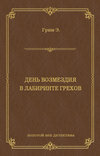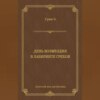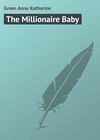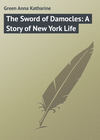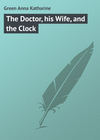Читать книгу: «Dark Hollow», страница 17
XXXII
THE VIGIL
When Mr. Black came into Shelby, he came alone. He was anxious to get back; anxious to face his enemies if he had any; anxious to see Deborah and explain. Miss Weeks and Reuther followed on more slowly; this was better for them and better for him, and better, too, for Deborah, who must hear his story without the distraction of her daughter's presence.
It was dark when he stepped on to the platform, and darker still when he rang the bell of Judge Ostrander's house. But it was not late, and his agitation had but few minutes in which to grow, before the gate swung wide and he felt her hand in his.
She was expecting him. He had telegraphed the hour at which he should arrive, and also when to look for Reuther. Consequently there was no necessity for preliminaries, and he could ask at once for the judge and whether he was strong enough to bear disappointment.
Deborah's answer was certainly disconcerting.
"I've not seen him. He admits nobody. When I enter the library, he retreats to his bedroom. I have not even been allowed to hand him his letters. I put them on his tray when I carry in his meals."
"He has received letters then?"
"Unimportant ones, yes."
"None from Oliver?"
"Oh, no."
A pause.
"Deborah?"
Another pause. The echo of that name so uttered was too sweet in her ear for her to cut it short by too hasty a reply. When she did speak, it was humbly, or should I say, wistfully.
"Yes, Mr. Black."
"I am afraid he never will hear from Oliver. The boy gave us the slip in the most remarkable manner. I will tell you when we get inside."
She led him up the walk. She moved slowly, and he felt the influence of her discouragement. But once in the lighted parlour, she turned upon him the face he knew best—the mother face.
"Did Reuther see him?" she asked.
Then he told her the whole story.
When she had heard him through, she looked about the room they were in, with a lingering, abstracted gaze he hardly understood till he saw it fall with an indescribable aspect of sorrow upon a picture which had lately been found and rehung upon the wall. It was a portrait of Oliver's mother.
"I am disappointed," she murmured in bitter reflection to herself. "I did not expect Oliver to clear himself, but I did expect him to face his accusers if only for his father's sake. What am I to say now to the judge?"
"Nothing to-night. In the morning we will talk the whole subject over. I must first explain myself to Andrews, and, if possible, learn his intentions; then I shall know better what to advise."
"Did the officer you met on your return from Tempest Lodge follow you to Shelby?"
"I have not seen him."
"That is bad. He followed Oliver."
"It was to be expected."
"Oliver is in Canada?"
"Undoubtedly."
"Which means—"
"Delay, then extradition. It's that fellow Flannagan who has brought this upon us. The wretch knows something which forbids us to hope."
"Alas, yes." And a silence followed, during which such entire stillness rested upon the house that a similar thought rose in both minds. Could it be that under this same roof, and only separated from them by a partition, there brooded another human being helplessly awaiting a message which would never come, and listening, but how vainly, for the step and voice for which he hungered, though they were the prelude to further shame and the signal for coming punishment.
So strong was this thought in both their minds, that the shadow deepened upon both faces, as though a presence had passed between them; and when Mr. Black rose, as he very soon did, it was with an evident dread of leaving her alone with this thought.
They were lingering yet in the hall, the goodnight faltering on their lips, when suddenly their eyes flashed together in mutual question, and Deborah bent her ear towards the street.
An automobile was slowing up—stopping—stopping before the gates! Deborah turned and looked at Mr. Black. Was it the police? No, for the automobile was starting up again—it was going. Whoever had come had come to stay. With eyes still on those of Mr. Black, whose face showed a sudden change, she threw her hand behind her and felt wildly about for the door-knob. She had just grasped it—when the bell rang. Never had it sounded so shrill and penetrating. Never had it rung quite such a summons through this desolate house. Recoiling, she made a motion of entreaty.
"Go," she whispered. "Open! I cannot."
Quickly he obeyed. She heard him pass out and down the walk, and through the first gate. Then there came a silence, followed by the opening of the second gate. Then, a sound like smothered greetings, followed by quickly advancing steps and a voice she knew:
"How is my father? Is he well? I cannot enter till I know."
It was Oliver!—come from some distant station, or from some other line which he had believed unwatched. Tumultuous as her thoughts were, she dared not indulge in them for a moment, or give way to gratitude or any other emotion. There were words to be said—words which must be uttered on the instant and with as much imperiousness as his own.
Throwing the door wide, she called down the steps:
"Yes, he is well. Come in, Mr. Ostrander, and you, too, Mr. Black. Instructions have been given me by the judge, which I must deliver at once. He expects you, Oliver," she went on, as the two men stepped in. "But not knowing when, he bade me say to you immediately upon your entrance (and I am happy to be able to do this in Mr. Black's presence), that much as he would like to be on hand to greet you, he cannot see you to-night. You may wish to go to him—but you must restrain this wish. Nor are you to talk, though he does not forbid you to listen. If you do not know what has happened here, Mr. Black will tell you, but for to-night at least, and up to a certain hour to-morrow, you are to keep your own counsel. When certain persons whose names he has given me can be gotten together in this house, he will join you, giving you your first meeting in the presence of others. Afterwards he will see you alone. If these plans distress you,—if you find the delay hard, I am to say that it is even harder for him than it can be for you. But circumstances compel him to act thus, and he expects you to understand and be patient. Mr. Black, assure Mr. Ostrander that I am not likely to overstate the judge's commands, or to add to or detract from them in the least particular—that I am simply the judge's mouthpiece."
"You may believe that, Mr. Ostrander." Young Ostrander bowed.
"I have no doubt of the fact," he assured her, with an unsuccessful effort to keep his trouble out of his voice. "But as my father allows me some explanation, I shall be very glad to hear what has happened here to occasion my imperative recall."
"Do you not read the papers, Mr. Ostrander?"
"I have not looked at one since I started upon my return."
Mr. Black glanced at Deborah, who was slipping away. Then he made a move towards the parlour.
"If you will come in and sit down, Mr. Ostrander, I'll tell you what you have every right to know."
But when they found themselves alone together, Oliver's manner altered.
"One moment," said he, before Mr. Black could speak. "I should like to ask you first of all, if Miss Scoville is better. When I left you both so suddenly at Tempest Lodge, she was not well. I—"
"She is quite recovered, Mr. Ostrander."
"And is here?"
"Not yet. I came back quickly—like yourself."
Involuntarily their glances met in a question which perhaps neither desired to have answered. Then Oliver remarked quite simply:
"My haste seemed warranted by my father's message. Five minutes,—one minute even is of great importance when you have but fifteen in which to catch a train."
"And by such a route!"
"You know my route." A short laugh escaped him. "I feared the delay—possibly the interference—But why discuss these unimportant matters! I succeeded in my efforts. I am here, at my father's command, unattended and, as I believe, without the knowledge of any one but yourself and Mrs. Scoville. But your reason for these hasty summons—that is what I am ready now to hear." And he sat down, but in such a way as to throw his face very much into the shadow.
This was a welcome circumstance to the lawyer. His task promised to be hard enough at the best. Black night had not offered too dark a screen between him and the man thus suddenly called upon to face suspicions the very shadow of which is enough to destroy a life. The hardy lawyer shrunk from uttering the words which would make the gulf imaginatively opening between them a real, if not impassable, one. Something about the young man appealed to him—something apart from his relationship to the judge—something inherent in himself. Perhaps it was the misery he betrayed. Perhaps it was the memory of Reuther's faith in him and how that faith must suffer when she saw him next. Instantaneous reflections; but epoch-making in a mind like his. Alanson Black had never hesitated before in the face of any duty, and it robbed him of confidence. But he gave no proof of this in voice or manner, as pacing the floor in alternate approach and retreat, he finally addressed the motionless figure he could no longer ignore.
"You want to know what has happened here? If you mean lately, I shall have to explain that anything which has lately occurred to distress your father or make your presence here desirable, has its birth in events which date back to days when this was your home and the bond between yourself and father the usual and natural one."
Silence in that shadowy corner! But this the speaker had expected, and must have exacted even if Oliver had shown the least intention of speaking.
"A man was killed here in those old days—pardon me if I am too abrupt—and another man was executed for this crime. You were a boy—but you must remember."
Again he paused; but no more in expectation of or desire for an answer than before. One must breathe between the blows he inflicts, even if one is a lawyer.
"That was twelve years ago. Not so long a time as has elapsed since you met a waif of the streets and chastised him for some petty annoyance. But both events, the great and the little, have been well remembered here in Shelby; and when Mrs. Scoville came amongst us a month or so ago, with her late but substantial proofs of her husband's innocence in the matter of Etheridge's death, there came to her aid a man, who not only remembered the beating he had received as a child, but certain facts which led him to denounce by name, the party destined to bear at this late day the onus of the crime heretofore ascribed to Scoville. That name he wrote on bridges and walls; and one day, when your father left the courthouse, a mob followed him, shouting loud words which I will not repeat, but which you must understand were such as must be met and answered when the man so assailed is Judge Ostrander. Have I said enough? If so, raise your hand and I will desist for to-night."
But no movement took place in the shadow cast by Oliver's figure on the wall before which Mr. Black had paused, and presently, a voice was heard from where he sat, saying:
"You are too merciful. I do not want generalities but the naked truth. What did the men shout?"
"You have asked for a fact, and that I feel free to give you. They shouted, 'Where is Oliver, your guilty son, Oliver? You saved him at a poor man's expense, but we'll have him yet.' You asked me for the words, Mr. Ostrander."
"Yes." The pause was long, but the "Yes" came at last. Then another silence, and then this peremptory demand: "But we cannot stop here, Mr. Black. If I am to meet my father's wishes to-morrow, I must know the ground upon which I stand. What evidence lies back of these shouts? If you are my friend,—and you have shown yourself to be such,—you will tell me the whole story. I shall say nothing more."
Mr. Black was not walking now; he was standing stock-still and in the shadow also. And with this space and the double shadow between them, Alanson Black told Oliver Ostrander why the people had shouted: "We will have him yet."
When he had quite finished, he came into the light. He did not look in the direction he had avoided from the first, but his voice had a different note as he remarked:
"I am your father's friend, and I have promised to be yours. You may expect me here in the morning, as I am one of the few persons your father has asked to be present at your first interview. If after this interview you wish anything more from me, you have only to signify it. I am blunt, but not unfeeling, Mr. Ostrander."
A slight lift of the hand, visible now in the shadow, answered him; and with a silent bow he left the room.
In the passageway he met Deborah.
"Leave him to himself," said he. "Later, perhaps, you can do something for him."
But she found this quite impossible. Oliver would neither eat nor sleep. When the early morning light came, he was sitting there still. Was his father keeping vigil also? We shall never know.
XXXIII
THE CURTAIN LIFTED
Ten o'clock! and one of the five listed to be present had arrived—the rector of the church which the Ostranders had formerly attended.
He was ushered into the parlour by Deborah, where he found himself received not by the judge in whose name he had been invited, but by Mr. Black, the lawyer, who tendered him a simple good morning and pointed out a chair.
There was another person in the room,—a young man who stood in one of the windows, gazing abstractedly out at the line of gloomy fence rising between him and the street. He had not turned at the rector's approach, and the latter had failed to recognise him.
And so with each new arrival. He neither turned nor moved at any one's entrance, but left it to Mr. Black to do the honours and make the best of a situation, difficult, if not inexplicable to all of them. Nor could it be seen that any of these men—city officials, prominent citizens and old friends, recognised his figure or suspected his identity. Beyond a passing glance his way, they betrayed neither curiosity nor interest, being probably sufficiently occupied in accounting for their own presence in the home of their once revered and now greatly maligned compeer. Judge Ostrander, attacked through his son, was about to say or do something which each and every one of them secretly thought had better be left unsaid or undone. Yet none showed any disposition to leave the place; and when, after a short, uneasy pause during which all attempts at conversation failed, they heard a slow and weighty step approaching through the hall, the suspense was such that no one but Mr. Black noticed the quick whirl with which Oliver turned himself about, nor the look of mortal anguish with which he awaited the opening of the door and his father's entrance among them. No one noticed, I say, until, simultaneously with the appearance of Judge Ostrander on the threshold, a loud cry swept through the room of "Don't! don't!" and the man they had barely noticed, flashed by them all, and fell at the judge's feet with a smothered repetition of his appeal: "Don't, father, don't!"
Then, each man knew why he had been summoned there, and knowing, gazed earnestly at these two faces. Twelve years of unappeased longing, of smothered love, rising above doubts, persisting in spite of doubts, were concentrated into that one instant of mutual recognition. The eye of the father was upon that of the son and that of the son upon that of the father and for them, at least in this first instant of reunion, the years were forgotten and sin, sorrow and on-coming doom effaced from their mutual consciousness.
Then the tide of life flowed back into the present, and the judge, motioning to his son to rise, observed very distinctly:
"DON'T is an ambiguous word, my son, and on your lips, at this juncture, may mislead those whom I have called here to hear the truth from us and the truth only. You have heard what happened here a few days ago. How a long-guarded, long-suppressed suspicion—so guarded and so suppressed that I had no intimation of its existence even, found vent at a moment of public indignation, and I heard you, you, Oliver Ostrander, accused to my face of having in some boyish fit of rage struck down the man for whose death another has long since paid the penalty. This you have already been told."
"Yes." The word cut sharply through the silence; but the fire with which the young man rose and faced them all showed him at his best. "But surely, no person present believes it. No one can who knows you and the principles in which I have been raised. This fellow whom I beat as a boy has waited long to start this damnable report. Surely he will get no hearing from unprejudiced and intelligent men."
"The police have listened to him. Mr. Andrews, who is one of the gentlemen present, has heard his story and you see that he stands here silent, my son. And that is not all. Mrs. Scoville, who has loved you like a mother, longs to believe in your innocence, and cannot."
A low cry from the hall.
It died away unheeded.
"And Mr. Black, her husband's counsel," continued the father, in the firm, low tones of one who for many long days and nights had schooled himself for the duty of this hour, "shares her feeling. He has tried not to; but he does. They have found evidences—you know them; proofs which might not have amounted to much had it not been for the one mischievous fact which has undermined public confidence and given point to these attacks. I refer to the life we have led and the barriers we have ourselves raised against our mutual intercourse. These have undone us. To the question, 'Why these barriers?' I can find no answer but the one which ends this struggle. Succumbing myself, I ask you to do so also. Out of the past comes a voice—the voice of Algernon Etheridge, demanding vengeance for his untimely end. It will not be gainsaid. Not satisfied with the toll we have both paid in these years of suffering and repression,—unmindful of the hermit's life I have led and of the heart disappointments you have borne, its cry for punishment remains insistent. Gentlemen—Hush! Oliver, it is for me to cry DON'T now—John Scoville was a guilty man—a murderer and a thief—but he did not wield the stick which killed Algernon Etheridge. Another hand raised that. No, do not look at the boy. He is innocent! Look here! look here!'" And with one awful gesture, he stood still,—while horror rose like a wave and engulfed the room—choking back breath and speech from every living soul there, and making a silence more awful than any sound—or so they all felt, till his voice rose again and they heard—"You have trusted to appearances; you must trust now to my word. I am the guilty man, not Scoville, and not Oliver, though Oliver may have been in the ravine that night and even handled the bludgeon I found at my feet in the recesses of Dark Hollow."
Then consternation spoke, and muttered cries were heard of "Madness! It is not we who are needed here but a physician!" and dominating all, the ringing shout:
"You cannot save me so, father. I hated Etheridge and I slew him. Gentlemen," he prayed in his agony, coming close into their midst, "do not be misled for a moment by a father's devotion."
His lifted head, his flashing eye, drew every look. Honour confronted them in a countenance from which all reserve had melted away. No guilt showed there; he stood among them, a heroic figure.
Slowly, and with a dread which no man might measure, the glances which had just devoured his young but virile countenance passed to that of the father. They did not leave it again. "Son?" With what tenderness he spoke, but with what a ring of desolation. "I understand your effort and appreciate it; but it is a useless one. You cannot deceive these friends of ours—men who have known my life. If you were in the ravine that night, so was I. If you handled John Scoville's stick, so did I, AND AFTER YOU! Let us not struggle for the execration of mankind; let it fall where it rightfully belongs. It can bring no sting keener than that to which my breast has long been subject. Or—" and here his tones sank, in a last recognition of all he was losing forever, "if there is suffering in a once proud man flinging from him the last rag of respect with which he sought to cover the hideous nakedness of an unsuspected crime, it is lost in the joy of doing justice to the son who would take advantage of circumstances to assume his father's guilt."
But Oliver, with a fire which nothing could damp, spoke up again:
"Gentlemen, will you see my father so degrade himself? He has dwelt so continually upon the knowledge which separated us a dozen years ago that he no longer can discriminate between the guilty and the innocent. Would he have sat in court; would he have uttered sentences; would he have kept his seat upon the bench for all these years, if he had borne within his breast this secret of personal guilt? No. It is not in human nature to play such a part. I was guilty—and I fled. Let the act speak for itself. The respect due my father must not be taken from him."
Confession and counter-confession! What were they to think! Alanson Black, aghast at this dread dilemma, ran over in his mind all that had led him to accept Oliver's guilt as proven, and then, in immediate opposition to it, the details of that old trial and the judge's consequent life; and, voicing the helpless confusion of the others, observed with forced firmness:
"We have heard much of Oliver's wanderings in the ravine on that fatal night, but nothing of yours, Judge Ostrander. It is not enough for you to say that you were there; you must prove it."
"The proof is in my succumbing to the shock of hearing Oliver's name associated with this crime. Had he been guilty—had our separation come through his crime and not through my own, I should have been prepared for such a contingency, and not overwhelmed by it."
"And were you not prepared?"
"No, before God!"
The gesture accompanying this oath was a grand one, convincing in its fervour, its majesty and power.
But facts are stubborn things, and while most of those present were still thrilling under the effect of this oath, the dry voice of District Attorney Andrews was heard for the first time, in these words:
"Why, then, did you, on the night of Bela's death, stop on your way across the bridge to look back upon Dark Hollow and cry in the bitterest tones which escape human lips, 'Oliver! Oliver! Oliver!' You were heard to speak this name, Judge Ostrander," he hastily put in, as the miserable father raised his hand in ineffectual protest. "A man was lurking in the darkness behind you, who both saw and heard you. He may not be the most prepossessing of witnesses, but we cannot discredit his story."
"Mr. Andrews, you have no children. To the man who has, I make my last appeal. Mr. Renfrew, you know the human heart both as a father and a pastor. Do you find anything unnatural in a guilty soul bemoaning its loss rather than its sin, in the spot which recalled both to his overburdened spirit?"
"No."
The word came sharply, and it sounded decisive; but the ones which followed from Mr. Andrews were no less so.
"That is not enough. We want evidence, actual evidence that you are not playing the part your son ascribes to you."
The judge's eyes glared, then suddenly and incomprehensively softened till the quick fear that his mind as well as his memory had gone astray, vanished in a feeling none of them could have characterised, but which gave to them all an expression of awe.
"I have such evidence," announced the judge. "Come."
Turning, he stepped into the hall. Oliver, with bended head and a discouraged mien, quickly followed. Alanson Black and the others, casting startled and inquiring looks at each other, brought up the rear. Deborah Scoville was nowhere to be seen.
At the door of his own room, the judge paused, and with his hand on the curtain, remarked with unexpected composure: "You have all wondered, and others with you why for the last ten years I have kept the gates of my house shut against every comer. I am going to show you."
And with no further word or look, scarcely even giving attention to Oliver's anguished presence, he led them into the study and from there on to that inner door known and talked of through the town as the door of mystery. This he slowly opened with the key he took from his pocket; then, pausing with the knob in his hand, he said:
"In the years which are past, but two persons beside myself have crossed this threshold, and these only under my eye. Its secret was for my own breast. Judge what my remorse has been; judge the power of my own secret self-condemnation, by what you see here."
And, entering, he reached up, and pulled aside the carpet he had strung up over one end of the room, disclosing amid a number of loosened boards, the barred cell of a condemned convict.
"This was my bed, gentlemen, till a stranger coming into my home, made such an acknowledgment of my sin impossible!"
Покупайте книги и получайте бонусы в Литрес, Читай-городе и Буквоеде.
Участвовать в бонусной программе











